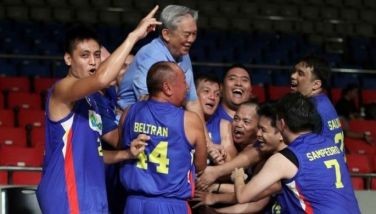Our responsibility
The Asian Games have opened, and once again, there will be a free-for-all in social media as viewers express their gratitude, admiration, disappointment and exasperation with the athletes, coaches, national sports associations, sports establishment and even the broadcasters and other press covering the various sports. Those following comments online will be inundated with negative comments, as well, and may be swayed against certain sports personalities. Favorite targets are the Philippine Sports Commission, Philippine Olympic Committee, the various NSAs and recently, the basketball team, particularly with the issue regarding Andray Blatche’s eligibility to play.
This may be a sensitive issue, but it gets harder and harder for the casual observer to discern who they should be listening to. Sometimes, we even get carried away by hoaxes, such as fake death announcements, innuendo, and other proclamations merely designed to get a rise out of people.
There are some basic ways to ensure that we are listening to the right people, especially when it comes to criticizing those involved with running our sports programs. Sometimes, we can no longer see the blurred lines between an irate fan and a real journalist who covers the sports beat regularly.
First of all, what is the source’s institutional affiliation? Is he or she merely an individual blogger who has a growing following, or an accredited journalist representing a major periodical or broadcast agency, or both? The current flows both ways. Some reporters have popular blogs where they publish their comments, experiences and other information that won’t fit in the allotted spaces of a newspaper’s pages. On the other hand, there are some sports bloggers who have managed to attract the attention of new media, like many of the new websites that cover Philippine sports. This is important because they are answerable to someone. They are regulated and conversely, protected, by an editorial team, proofreaders, researchers, editors. Information and research is shared. They are ruled by a code of ethics. It isn’t a hundred percent foolproof, but it works the great majority of the time.
Secondly, what is their relation with the subject? Are they a family member, fellow alumnus, business partner, or friend? This colors their agenda in reporting or commenting on an issue or a person. This writer had an unpleasant experience after an on-air interview with a blogger at about this time five years ago. After the interview, I corrected an erroneous fact mentioned on the air, what resulted was an attack on myself through the said blog, much of which was personal and unwarranted. I was even accused of not knowing anything about online journalism, when a cursory fact-check would have revealed that I was, in fact, the first-ever editor of an all-Filipino online sports website, www.philsports.net, at the turn of the new millennium.
Third, are they using their real name and likeness when they make statements and criticism online? This is very prevalent in social networking sites and in chatrooms. Real journalists don’t need to use pseudonyms. They stand behind what they write, and take the risks associated with being bold. Those of us on television have learned not to give too much weight to what anonymous armchair critics say online, because they don’t have the courage to out their names and faces behind what they say. It’s easy to spew bile and be vicious when you’re hiding in the dark. Even as a Senate correspondent, I was once interviewed by a senator’s aide regarding a report of misuse of a government plane. I had mentioned a handful of sitting senators using the plane to campaign, but there was another legislator’s name that had appeared on the passenger manifest but was legally allowed to use the aircraft. That legislator was not mentioned in my report, but since I needed to substantiate it by showing the manifest, his name was there. Part of the hazards of the job. But since my facts and documentation were all in order, nothing came of it.
Fourth, are they attacking the person, or their actions? This is the greatest differentiator between reporting, commentary, and irresponsible journalism. The most professional way to handle it is to say what the person did wrong, not make a sweeping generalization about their person. Attack the deed, not the doer. Once you go after the person, you cross a line by calling them names, and you just get into trouble. It is better to simply enumerate the actions or track record of the individual. For example, what makes a coach successful? Winning championships. There is no argument on who has won the most, it is a fact beyond question. This is the part where a lot of bloggers and even ordinary people commenting on social networks sometimes go over the line. To suggest, for example, that someone should be replaced as a player or coach, is an opinion. If the person in question has a track record of losing games for his team, then that is another story. Sometimes, people just want to vent, and find a convenient target in those who stick their necks out on a journey to get better while serving the country in sports. This is a sad fact that those in the public eye accept, especially in basketball, which many Filipinos have a strong opinion about.
Fifth, are they forthcoming about their own experience with the person they care criticizing? Do they know them personally? Or did they simply ask for an autograph one time and feel rebuffed, and decided to go on a vendetta against that person? If they take it personally, then they shouldn’t be writing about it, since it is not a general observation. Bill Russell, for example, loathed giving autographs. He simply didn’t believe in it. PBA icons Sonny Jaworski and Alvin Patrimonio, on the other hand, have always been the opposite. Even on a bad day, they don’t say no to admirers, and that has endeared them to the public.
Sixth, are they looking at all (not just two) sides of the issue? One time, I heard a commentator say that in a previous encounter between two PBA teams, one player had had a bad game and played poorly. Upon review of the stats of the said previous game, I learned that the player who had been criticized actually scored six points in the first couple of minutes then sprained his ankle badly and could not continue. Imagine how he felt when he heard those statements about his lack of success against the other team.
There have been many instances of premature or erroneous comments hurting the careers of athletes and other people in sports. Richard Jewell, the security officer who discovered the bag containing homemade explosives which caused the Atlanta Olympic Centennial Park bombing in 1996, evacuated dozens of people before the explosion, saving their lives. I happened to walking by with my colleague Ron delos Reyes when the explosion occurred. The hero Jewell was falsely linked to the bombing, and his name became Mud all over the world. Not too many people recall that the accusations were based on incomplete information and he was innocent, but it ruined his career. For all of Dennis Rodman’s off-court shenanigans, he was an incredibly gifted basketball player. This was pointed out by NBA statistician Elliot Kalb in his book “Who’s Better, Who’s Best in Basketball?”, where he defends Rodman, who was later elected to the Naismith Memorial Basketball Hall of Fame.
It is more challenging to just read about sports news these days, but then again, that is our responsibility as readers to know who is really saying what, and why. Some people get on their soapbox with an agenda other than reporting the facts or deducing a provable pattern. Let’s be wary of them.
- Latest
- Trending































